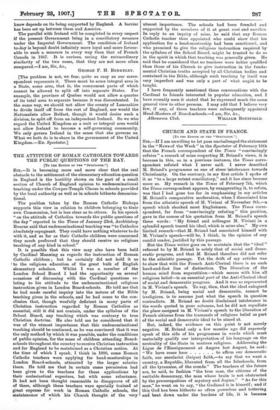THE ATTITUDE OF ROMAN CATHOLICS TOWARDS THE PUBLIC QUESTIONS OF
THE DAY.
[To ran Enrros or rite "3rscreros..1
SIR,—It is becoming more and more clear that the real obstacle to the settlement of the elementary education question in England is the hostility shown on the part of a small section of Church of England opinion to undenominational teaching under the Cowper-Temple Clause in schools provided by the local authority as well as in schools hitherto denomina- tional.
The position taken by the Roman Catholic Bishops supports this view in relation to children belonging to their own Communion, but is less clear as to others. In his speech " on the attitude of Catholics towards the public questions of the day" reported in the Times of January 23rd, Archbishop Bourne said that =denominational teaching was "to Catholics absolutely repugnant. They could have nothing whatever to do with it, and so far as their Catholic children were concerned they much preferred that they should receive no religious teaching of any kind in school."
It is possible that this view may also have been held by Cardinal Manning as regards the instruction of Roman Catholic children ; but he certainly did not hold it as to the religious education of the great bulk of English elementary scholars. Whilst I was a member of the London School Board I had the opportunity on several occasions of discussing with the Cardinal questions re- lating to his attitude to the undenominational religions instruction given in London Board-schools. He told me that he had made careful inquiry into the nature of the Bible teaching given in the schools, and he had come to the con- clusion that, though woefully deficient in many parts of Christian instruction regarded by Roman Catholics as essential, still it did not contain, under the syllabus of the School Board, any teaching which was contrary to true Christian doctrine. He also told me he considered that it was of the utmost importance that this =denominational teaching should be continued, as be was convinced that it was the only method by which it was possible, under the conditions of public opinion, for the mass of children attending Board- schools throughout the country to receive Christian instruction and for England to be maintained as a Christian nation. At the time of which I speak, I think in 1886, some Roman Catholic teachers were applying for head-masterships in London Board-schools, attracted by the larger salaries there. He told me that in certain cases permission had been given to the teachers for these applications by their ecclesiastical superiors, but with some reluctance. It had not been thought reasonable to disapprove of all of them, although these teachers were specially trained at great expense for work in Roman Catholic schools, the
maintenance of which his Church thought of the very •
utmost importance. The schools had been founded and supported by the members of it at great cost and sacrifice In reply to an inquiry of mine, he said that any Roman Catholic teacher thus appointed who could show that his application for a head-mastership had been sanctioned, and who promised to give the religious instruction required by the syllabus of the School Board, might be trusted to do so in the spirit in which that teaching was generally given. He said that be considered that no teachers were better qualified than those of his Church to give instruction in the funda- mental Christian truths accepted by all Christian bodies and contained in the Bible, although such teaching by itself was very imperfect and was only a part of what ought to be taught.
I have frequently mentioned these conversations with the Cardinal to friends interested in popular education, and I have recently seen it stated that he expressed much the same general view to other persons. I may add that I believe very few, if any, of these teachers were subsequently appointed Head-Masters of Board-schools.--I am, Sir, &c.,










































 Previous page
Previous page